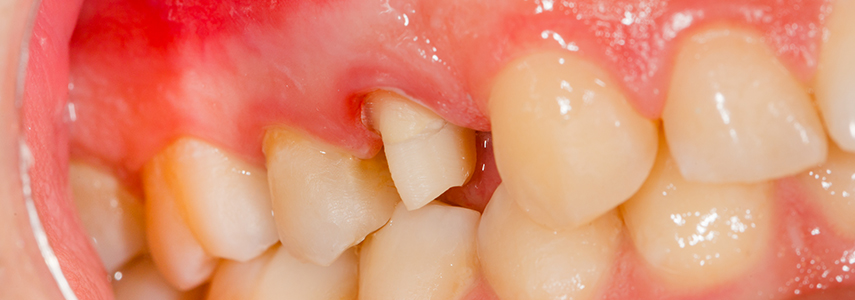Recent innovations in the field of molecular genetics offer the possibility of improving the phases of diagnosis and prognosis in different medical fields. In the field of dentistry, new DNA tests could provide useful information especially in the diagnosis of genetic predisposition to periodontitis.
Genetic predisposition to periodontitis: the causes
Periodontitis is the disease that affects the periodontium, ie the set of gingiva, alveolar bone, periodontal ligament and root cement. The continuous inflammation of the periodontal system involves the progressive collapse of the same, up to the irreversible point of tooth loss.
 The probability of contracting the disease is linked to a particular genetic component. The probability of contracting the disease is linked to a particular genetic component. The research in fact focused on subjects with excellent oral hygiene, with a low presence of bacteria in the oral cavity and yet affected by periodontitis with consequent bone resorption.
The probability of contracting the disease is linked to a particular genetic component. The probability of contracting the disease is linked to a particular genetic component. The research in fact focused on subjects with excellent oral hygiene, with a low presence of bacteria in the oral cavity and yet affected by periodontitis with consequent bone resorption.
American researchers, from a thorough genetic analysis, identified the cause in a variant of DNA that leads to increased production of IL-1, the inflammatory mediator Interleukin. What happens in subjects with this variant of DNA is an excessive immune response, with consequent activation of osteoclasts, which causes a rapid bone resorption.
Other more recent studies have also highlighted another variant associated with the genetic predisposition to periodontitis: the IL-1 antagonist receptor, that is IL-1RN which is weaker in its function as an inhibitor of the inflammatory process. The presence of both DNA variants, ie an overproduction of Interleukin 1 and a weakening of interleukin 1 RN, implies an even higher probability of being subject to gingivitis and periodontitis.
Obviously the presence of a hereditary component and the set of other risk factors, such as smoking or poor oral hygiene, exponentially increase the probability of contracting periodontitis.
Genetic predisposition to periodontitis and loss of implants
Genetic predisposition to periodontitis also affects the likelihood of contracting peri-implantitis. Those who test positive for the IL-1 genetic variant have a three times higher risk of losing the dental implant.
How to diagnose genetic predisposition to periodontitis?
 In the field of biotechnology, many solutions are being developed which, based on molecular genetics, can help medicine to identify increasingly personalized treatments.
In the field of biotechnology, many solutions are being developed which, based on molecular genetics, can help medicine to identify increasingly personalized treatments.
In the field of dentistry, tests exist that continue to develop to identify the genetic predisposition to periodontitis and the evolution of the pathology.
This type of diagnostic tests are based on a genetic test that allows the identification of the DNA variant and the IL-1 hyperproduction and a microbiological test that allows the identification of periodontopathogenic bacteria.
Molecular biology techniques are much more detailed and specific than traditional techniques for the detection of bacterial charges. Thanks to these new genetic tests it will be possible for the dentist to develop personalized therapeutic treatments.
















